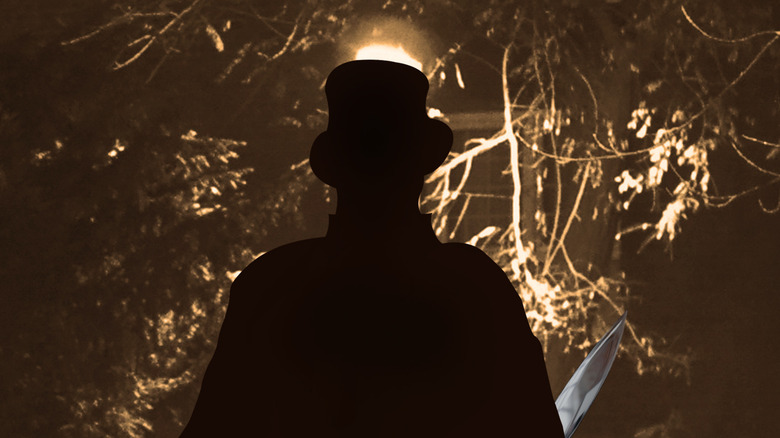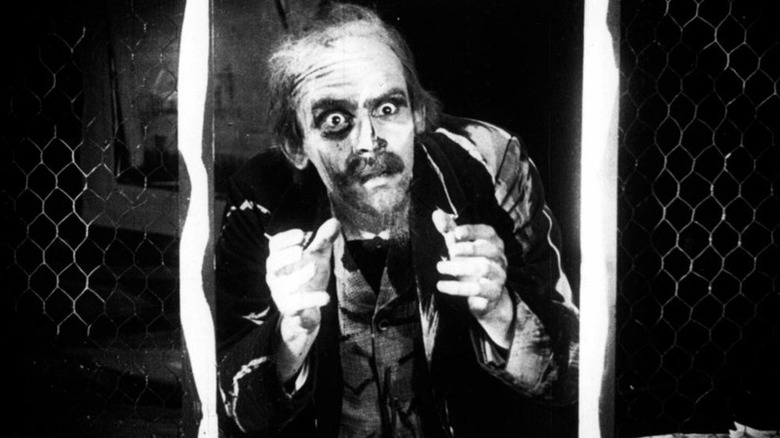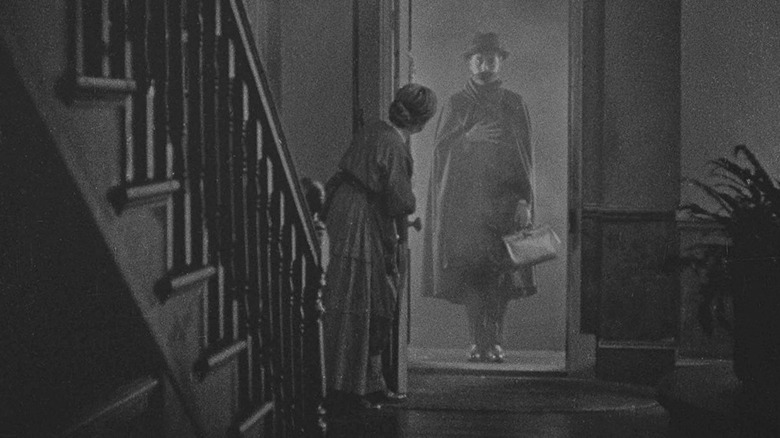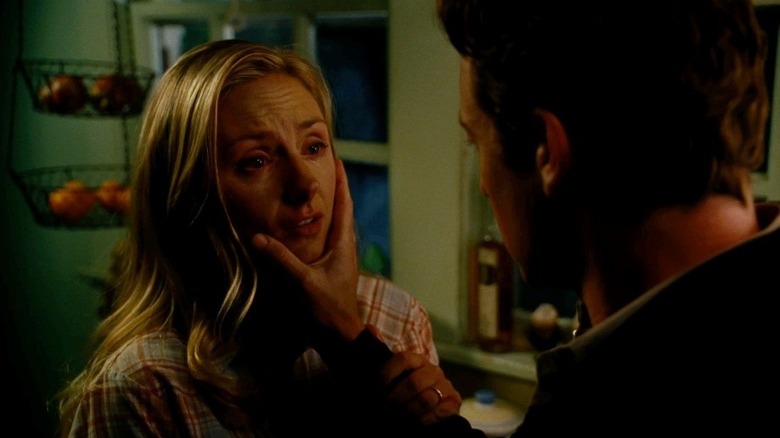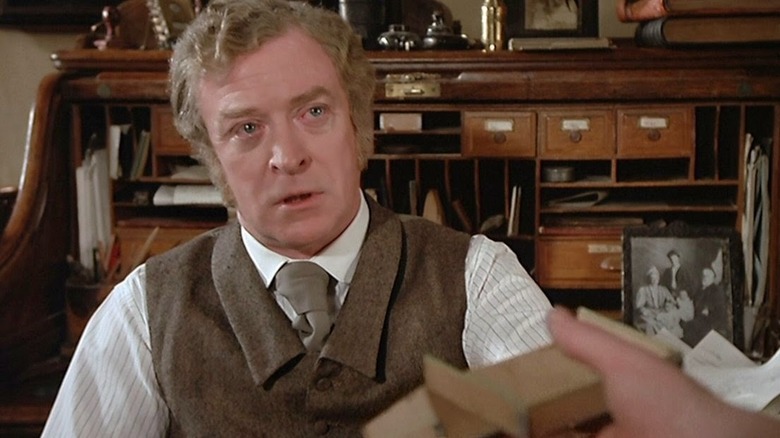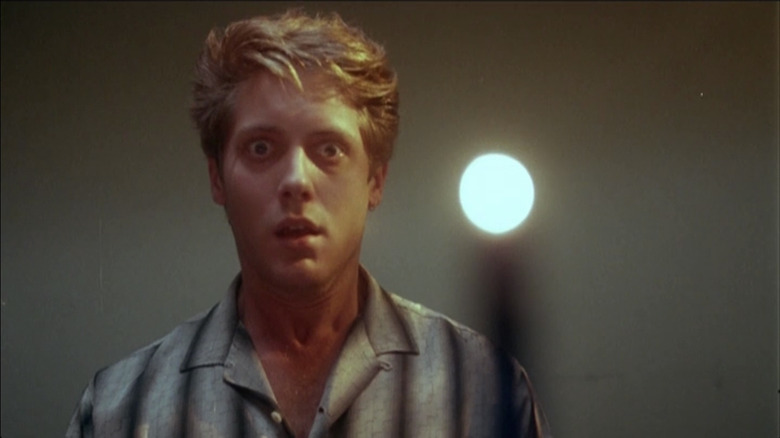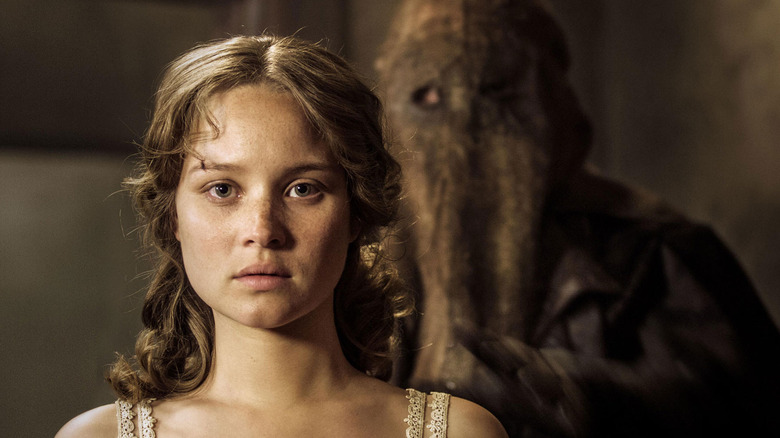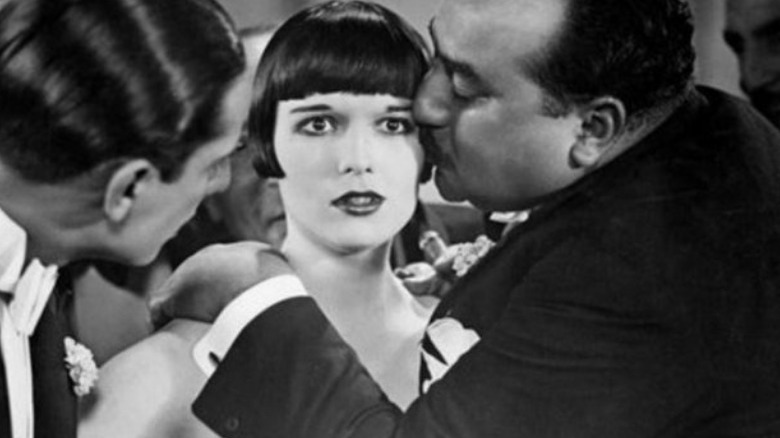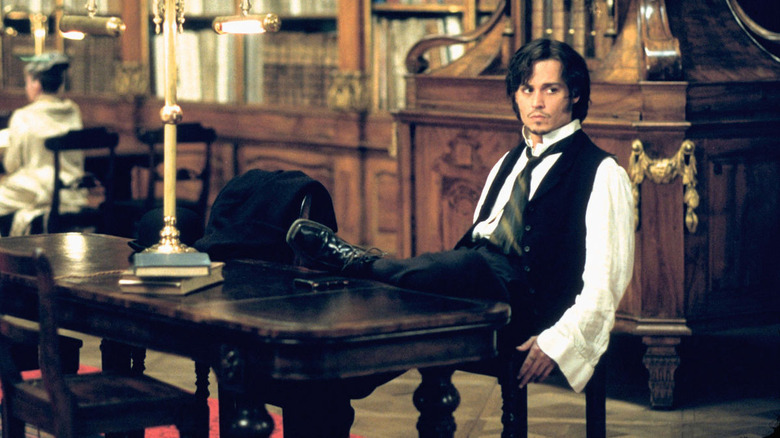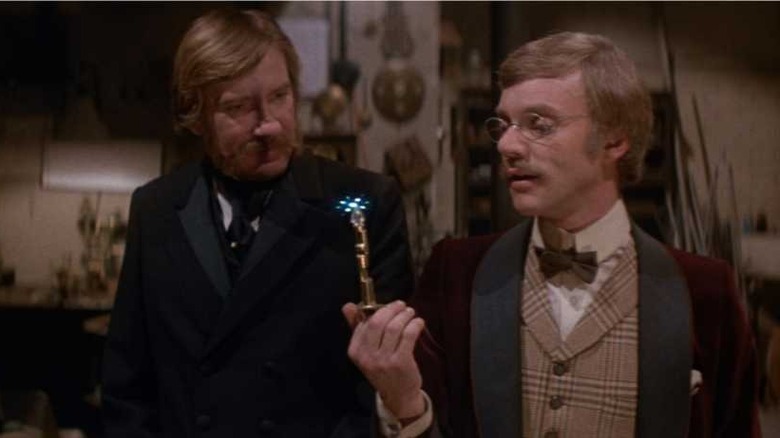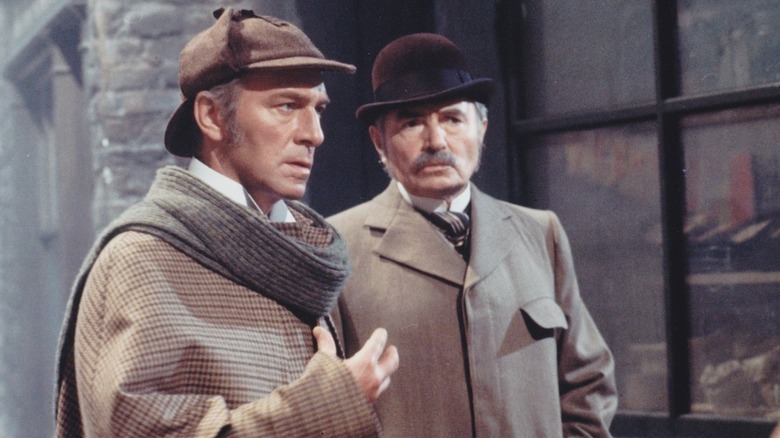Movies Inspired By Jack The Ripper
We may receive a commission on purchases made from links.
When it comes to historical serial killers, Jack the Ripper is by far the most notorious of the bunch. This menacing murderer operated in a short window between August 7 and September 10, 1888 (via History). He wasn't the most prolific serial killer in history, having murdered only five people, but his crimes were beyond ghastly. Blend that with the fact that he was never caught, and this killer's story has become filled with a sense of myth.
All of the Ripper's victims were killed with vicious, surgical precision, but the killer didn't just end lives; he butchered bodies. Each of his victims and their deaths followed the same modus operandi. They were all sex workers, and when their corpses were discovered, they'd been cut open and had organs — kidneys, uteruses, and the like — removed. The common thought surrounding this mutilation is that the Ripper had a deep-rooted disdain for women.
The mystery surrounding the killer and the brutal way in which he left his victims, something not known to be as common in those days as it is in the modern era of serial killers, has influenced and inspired the horror film genre for about as long as it's been around. The movies tend to be thrilling and suspenseful while retaining the sense of mystery the Jack the Ripper killings have always contained, and they're definitely worth seeing if you're a Jack the Ripper fan. Let's take a look.
The oldest film depiction of Jack the Ripper
Amazingly, Jack the Ripper has been in films since the era of silent motion pictures, which started not long after he was operating. He can be seen (but not heard) in black and white in the movie "Waxworks" from 1924. The film, as Movies Silently explains, is a German-made production about a writer who's employed to pen stories about a wax museum's most popular exhibits. One of them being good old Ripper Jack. This, like most Ripper films, is a horror story. The wax statue of the Ripper comes to life and chases the author, stabbing him through the heart at the end. Don't worry though, you discover at the end of the film that this has all been a dream.
Though this movie might not be entirely about Jack the Ripper, it was the character's first appearance in film, and one thing that makes it all the more chilling is that if the Ripper was, say, 20 years old at the time he committed his slayings in London, he would've only been 56 when this film came out. That means Jack the Ripper could've laughed at their poor portrayal of him with a bowl of popcorn in his lap. Probably a large Diet Coke too. He seems like the type.
Alfred Hitchcock is inspired by the London serial killer
One of the greatest minds in classical horror is undoubtedly Alfred Hitchcock, director of "Psycho" and "The Birds." The famed director continued to make films well into the '60s, as his IMDb profile shows, but he had been directing movies a long time before then. According to The Spooky Isles, this film legend even took a shot at a Jack the Ripper-inspired movie.
In 1927, again this was back when motion pictures were still relatively new and without any sort of in-time recorded audio, the film "The Lodger: A Story of the London Fog" was released into the world. This classic silent movie entails the story of a serial killer loose in the London streets, which sounds vaguely familiar. The tale starts with the lifeless body of a girl along the Thames with the calling card from a mysterious killer left on top of her corpse. Now, back in the '20s, viewers weren't going to get behind mutilated corpses, but the real Ripper left a calling card of sorts too in the way he disemboweled his victims. More murders occur throughout the film while a Hitchcock-classic police officer tries and fails to pin down the killer, which when you think about it, definitely mirrors the White Chapel killings of 40 years prior. The difference is that in "The Lodger" we see the killer's face; with the case of Jack the Ripper, we may never know the killer's identity.
A Jack the Ripper movie remade time and time again
Remakes of older movies are something we've grown accustomed to in this day and age, but back in years past, the movie industry was still fleshing out its portfolio and had a plethora of new ideas that usually kept them from remaking the same movies we'd already seen. But the Jack the Ripper movie "The Lodger" might have well set the precedent for remakes.
Yes, "The Lodger: A Story of the London Fog" has already made the list, but we're talking about "The Lodger" movies that came after the 1927 original. According to A Lost Film, there was a 1932 talking remake of "The Lodger" (the cut version was called "The Phantom Fiend") that followed the storyline from the original movie and even used the same main character. The next remake, as Spectrum Culture explains, came out in 1944. This film delved deep into the psychology of the killer. The remake after that, and one you may have actually seen, came out in 2009. Unlike the first three movies, this film was about a Jack the Ripper copycat trying to recreate the White Chapel murders in present day Los Angeles. It's a tribute to Hitchcock in a way and embodies much of his signature, cliché style.
There's actually one more film from 1953, as IMDb notes, that goes by the name "Man in the Attic" that's based on the same book as "The Lodger" but isn't a direct remake.
A fictional hunt for the murderer at White Chapel
In 1988, the British TV network ITV released a two-part miniseries, titled "Jack the Ripper," that was really just a movie cut in half. The IMDb profile will show you that one big name was conscripted to play the part of inspector Frederick Abberline, so if you want to see Michael Caine in a pretty awesome Jack the Ripper film(s), this is the one.
Besides the cast, this movie should be appreciated for its other high marks. It's a fictional account of investigations surrounding the White Chapel murders, but film critic Kim Newman says, as of 2017, it was the most well-researched Jack the Ripper movie on the market. Many other films inspired by this story tend to give the viewer one person of interest, that being the royal surgeon Sir William Gull, who's often theorized by Ripper buffs to be one of a small handful of potential identities of the murderer. This movie, however, gives a sample of potential killers before ultimately coming back around to settle on— you should probably see for yourself. It is a mystery after all.
This 1988 film did a couple firsts that would later be copied by other Jack the Ripper-based movies, including running the story from investigator Abberline's point of view and giving the main characters relatable struggles outside of the murders. For that alone, it's worth the watch.
Jack the Ripper's MO comes back to haunt investigators
The horrific way in which Jack the Ripper killed his victims is perfectly capable of making a horror movie even if the Ripper himself never makes an appearance, and 1988's "Jack's Back" proves this.
This movie does some pretty interesting things with James Spader. To start with, the actor is two of the main characters, according to critic Roger Ebert. He plays a set of twin brothers. One, as cliché as this is going to sound, the good-guy medical student while the other brother is the rebellious type whose run-ins with the law lead to him being the main suspect in the film's main murder investigation. The crimes take place a century after the White Chapel murders — not roughly, but to the exact day. A copycat is on the loose, butchering women in the streets.
The suspected brother finds himself in the odd position of both running from the cops and saving the woman that he and his brother have both been in love with. Yeah, the story line gets kind of messy there. Anyway, the movie has about a thousand twists and turns that will keep any viewer enthralled, but it's Spader's work that really makes it worth watching since, in a move that's cinematically ground-breaking, the actor plays a good guy for the first time. Well, two of them actually. (Or does he?)
A photographer investigates the Ripper murders
Films taking place in the midst of Jack the Ripper's twisted operations are sure to keep coming out of the collective film-box of humanity for years to come. The case is an interesting one. Plus, it's a real-life cold case, and everyone knows, or at least thinks they know, the story. One of the more recent movies in that vein hails not from England or the U.S., where you're most likely to find Ripper films, but from Germany.
"Jack The Ripper: The London Slasher" has an interesting storyline, though the fact that Londoners are speaking German might distract your attention just a bit. A young, German photographer, as Movies and Mania tells, moves to big city London in hopes that she'll be able to start a new life. She's supposed to be meeting her brother in the city, but when she gets there, said brother is locked in a mental institution. Why? Well, authorities think he's the man behind the White Chapel slayings. Oh no!
Anna, the photographer, knows her brother better than anyone, and she's convinced he's not the killer, but the police think they have the right guy. So, of course, Anna has to solve the case herself. The next natural step is for the actual Ripper to come after the young girl on his trail, and he does. But who ends up catching whom? You'll have to watch it to find out, probably with the subtitles on though.
A Ripper film with some antiquated themes
Okay, time to head back to the '20s when misogyny was considered a pendant of pride and everything men did was because of some woman in their lives. God forbid anyone be held accountable. This movie, "Pandora's Box," really hits on those themes in all the wrong ways. Sure, it was 1929, but just because something's history doesn't make it right. But hey, it's still a Jack the Ripper film, so here it is.
The silent movie follows a showgirl named Lulu, as The Criterion Collection explains. Lulu has a very powerful aura of sexuality that has damaging effects on all the men she meets. Throughout the movie, she goes through this downward spiral that costs her jobs and wellbeing until she eventually turns to sex work, you know, because men being attracted to you "too much" really wrecks your life. Granted, as critic Robert Ebert points out, she adamantly says she's not a sex worker in the film until the end, but the whole plot does a lot more than hint at it from the get go. All those who fall in love with Lulu in the film succumb to terrible deaths, and eventually, Lulu finds herself in an even more precarious situation when she takes on a client who turns out to be Jack the Ripper.
People love this movie despite all of those sexually-charged faults though, as is made evident by its 93% score on Rotten Tomatoes.
Some of the most famous faces of our time
Many of the faces in the films on this list you might not recognize. They were either made before our time or in foreign countries, or there's a chance you're just not that into movies. Whatever, it's okay. The next Jack the Ripper movie on our list is "From Hell," and unless you've been living under a rock for the past 20 years, you'll know a bulk of the main cast.
This film, as its IMDb page shows, features Ian Holm, Heather Graham, Robbie Coltrane, and the great Johnny Depp. You might remember Holm from his role in one of the most popular trilogies of all time, "Lord of the Rings," in which the actor played the hobbit Bilbo Baggins (via IMDb). Graham has been in a ton of media, from "Scrubs" to "Austin Powers" to "Californication" and literally more than 100 others (also IMDb). Then there's Coltrane who plays the lovable half-giant Hagrid in the "Harry Potter" films (again IMDb). Johnny Depp, of course, needs no introduction.
"From Hell" only scored a 6.8/10 on IMDb, but it's still a lot of fun. Inspector Abberline, played by Depp, hunts the Ripper and is aided by visions brought on through opium consumption, as Movie Mistakes explains. Obviously, this is a gift and a curse. Graham's character is a sex worker who's drawn into the mix. There's a conspiracy at work in the shadows, and these two help unravel everything. The end.
A time traveling-Ripper in 1979
Things are about to get weird with this one. "Time After Time" is a sci-fi experience with Jack the Ripper as the villain, and it's a classic. This movie scored an 87% on Rotten Tomatoes, and as an added bonus, it brings Jack the Ripper story into the modern days of 1979 when the film was released, literally.
The storyline for the movie is fun. H.G. Wells (the character, not the real guy) builds a time machine with the intention of fleeing to some future paradise. Wells, if you don't know, wrote the classic novel "The Time Machine" just a few years after the White Chapel murders, so it plays perfectly into the theme. Unfortunately for the author, the Ripper hijacks his machine before he can use it and skips town to 1979's San Francisco, as The Hollywood Reporter records. This, of course, explains why the Ripper was never actually caught. It's not easy to catch someone who's almost a century in the future, but Wells tries anyway.
The writer follows the Ripper to then-modern times and has a heck of a go at adjusting to all of the future technology, which is maddening because he invented a freaking time machine, and you'd think a 80-something-year advancement wouldn't throw him off too much. Anyway, the Ripper is doing his thing while Wells has teamed up with a contemporary woman to help catch the villain. This sci-fi movie has a near perfect blend of comedy and mystery. It's great.
Sherlock Holmes takes on the Ripper case
Jack the Ripper and the White Chapel slayings is one of the most classic mysteries in history with a whodunit that might never get figured out, but there's one man who laughs in the face of mystery, one man who would never fail to solve a crime, and that's Sherlock Holmes. Why no one thought of putting this perfect pairing on the screen before 1979 is the real mystery here, but at least it came around at some point.
"Murder by Decree" begins like any other classic Jack the Ripper story, according to a The New York Times' article from when it was released, with a woman who's quite obviously a sex worker being run down by the historic villain. Holmes jumps on the case, confused why Scotland Yard hadn't come to him for help as they were obviously unequipped to solve the mystery. As you might expect, Holmes gets to the bottom of the conspiracy that's afoot, but we're not about to give you all of those details. You'll have to see them for yourself.
Oddly enough, this movie has more of a tie to reality than you might think. The person on whom Arthur Conan Doyle based his beloved character, Dr. Joseph Bell, actually did investigate the White Chapel murders, and some think he even solved the case, according to the Scottish Field.
